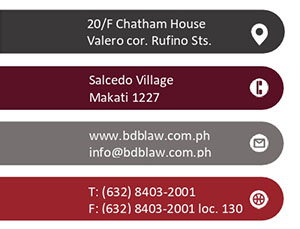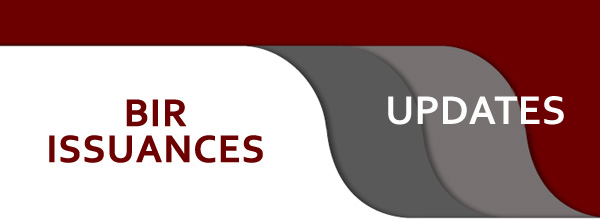

JULY • VOL. 5 • SERIES OF 2024
INSIGHTS is a monthly publication of BDB LAW to inform, update and provide perspectives to our clients and readers on significant tax-related court decisions and regulatory issuances (includes BIR, SEC, BSP, and various government agencies).

DISCLAIMER: The contents of this Insights are summaries of selected issuances from various government agencies, Court decisions, and articles written by our experts. They are intended for guidance only and as such should not be regarded as a substitute for professional advice.
Copyright © 2024 by Du-Baladad and Associates (BDB Law). All rights reserved. No part of this issue covered by this copyright may be produced and/or used in any form or by any means – graphic, electronic, and mechanical without the written permission of the publisher.
What's Inside ...
- HIGHLIGHTS FOR JUNE 2024
- SIGNIFICANT COURT DECISIONS
- Court of Tax Appeals
- SIGNIFICANT REGULATORY ISSUANCES
- Bureau of Internal Revenue
- PUBLISHED ARTICLE
- The EOPT Act in Transition
- OUR EXPERTS
- The Personalities
- The Personalities


HIGHLIGHTS for JUNE 2024
COURT OF TAX APPEALS DECISIONS
-
If the RTC's final decision, order, or resolution does not pertain to a local tax case, then the CTA is bereft of jurisdiction to entertain an appeal. (DOLE Philippines Inc. – Stanfilco Division v.The Sangguniang Panlungsod of the City of Davao, and the Hon. Sara Z. Duterte-Carpio and Hon. Lawrence D. Bantiding, CTA AC No. 286, June 7, 2024)
- Jurisdiction questioning the validity of CIR’s collection is different from jurisdiction questioning the validity of the assessment. (Tower Club, Inc. v. Commissioner of Internal Revenue, CTA Case No. 10384, June 25, 2024)
- An application for compromise settlement is not a continuation of taxpayer's administrative protest. (Producer's Savings Bank Corporation v. Commissioner of Internal Revenue, CTA Case no. 11485, June 21, 2024)
-
A new LOA is not needed for the reinvestigation/ reconsideration of the assessment made on the taxpayer. (Alberto Lim Tangso/ A.L. Electrical Shop & Parts Supply v. Commissioner of Internal Revenue, CTA Case No. 10367, June 18, 2024)
- The breakdown which indicates the term "zero-rated sale" does not cure the taxpayer's failure to comply with the imprinting requirement. (Schaeffler Philippines, Inc. v. Commissioner of Internal Revenue, CTA Case No. 10358, June 25, 2024)
-
A prior tax clearance in favor of an absorbed corporation is unnecessary for the surviving corporation to absorb the former's unutilized input VAT. (PMFTC Inc. v. Commissioner of Internal Revenue, CTA Case No. 10714, June 19, 2024)
BIR ISSUANCES
- Revenue Regulations No. 11-2024, June 13, 2024 – This amends the transitory provisions relative to the deadlines for compliance with the invoicing requirements.
- Revenue Memorandum Circular No. 65-2024, June 14, 2024 – This clarifies certain issues relative to output VAT credit on uncollected receivables.
- Revenue Memorandum Order No. 23-2024, June 19, 2024 - This prescribes the guidelines, policies, and procedures in the implementation of the risk-based approach in the verification and processing of VAT refund claims.

If the RTC's final decision, order, or resolution does not pertain to a local tax case, then the CTA is bereft of jurisdiction to entertain an appeal.
A local government unit demanded the payment of environmental tax from the taxpayer. After unsuccessfully questioning the environmental tax assessment and demanding a refund of the same at the administrative level, the taxpayer filed an appeal before the regional trial court (“RTC”). However, the case was dismissed which prompted the taxpayer to file an appeal with the tax court.
The taxpayer argued that the tax court possesses jurisdiction because the subject matter of the action is a local tax. This is bolstered by the Watershed Code and its IRR which named the exaction as an "environmental tax.”
However, the tax court decided against the taxpayer since its appellate jurisdiction over decisions of the RTC becomes operative only when the RTC has ruled on a local tax case. If the RTC's final decision does not pertain to a local tax case, then the CTA is bereft of jurisdiction to entertain the same.
If generation of revenue is the primary purpose, the imposition is a tax. However. To accurately classify these exactions, the objectives and purposes of the pertinent tax ordinance must be consulted. The tax court found that the environmental taxes imposed under the Watershed Code are fees, and not taxes, as the object and nature thereof are mainly one for regulation. (DOLE Philippines Inc. – Stanfilco Division v.The Sangguniang Panlungsod of the City of Davao, and the Hon. Sara Z. Duterte-Carpio and Hon. Lawrence D. Bantiding, CTA AC No. 286, June 7, 2024)
Jurisdiction questioning the validity of CIR’s collection is different from jurisdiction questioning the validity of the assessment.
The taxpayer filed a Motion for Reconsideration against the Final Decision Disputed Assessment (“FDDA”). Despite the appeal pending with the office of the Commissioner, the taxpayer’s bank account was garnished. Aggrieved, the taxpayer filed an appeal before the CTA questioning the garnishment.
While the case is pending, the taxpayer received on March 27, 2023, a decision of the CIR granting the Motion for Reconsideration, thereby canceling and withdrawing the FDDA. Thus, on May 19, 2023, the taxpayer filed a supplemental petition bringing the administrative Decision to the Court’s attention.
The CTA ruled that although they have jurisdiction over the original petition questioning the garnishment, it did not acquire jurisdiction over the . Here, the taxpayer received the administrative Decision on March 27, 2023, giving it until April 26, 2023, within which to file its judicial appeal. It filed its Supplemental Petition, attached to its motion to admit the same, on May 19, 2023. This was 53 days from its receipt of the administrative Decision and 23 days from the end of 30-day period. Accordingly, the administrative Decision has become final and executory. As such, even if the CTA had gained jurisdiction over the same, there would be nothing left for it to declare null and void. (Tower Club, Inc. v. Commissioner of Internal Revenue, CTA Case No. 10384, June 25, 2024)
An application for Compromise
Settlement is not a continuation of taxpayer’s administrative protest.
The BIR garnished the taxpayer’s various accounts due to the latter’s failure to file a protest on the FAN. In response thereto, the taxpayer filed a protest letter against the garnishment. Unmoved, the BIR denied the protest and maintained the garnishment.
Rather than filing a judicial protest with the CTA, the taxpayer applied for a Compromise Settlement on the ground of financial incapacity. Such application was still denied by the BIR. This prompted the taxpayer to amend its application and invoked the ground of doubtful validity. Over a year later, the BIR denied the application to which the taxpayer filed a judicial appeal to the CTA.
The CTA ruled that the appeal must be dismissed due to lack of jurisdiction. The court explained that an application for Compromise Settlement is not a continuation of administrative protest. Thus, the counting of the 30-day period to appeal cannot be counted from the denial of the Compromise Settlement. The CTA reasoned out that to consider applications for compromise as "administrative protests" would allow taxpayers to indefinitely delay filing a judicial appeal, rendering the 30-day period for such nugatory. (Producers Saving Bank Corporation. v. Commissioner of Internal Revenue, CTA Case No. 11485, June 21, 2024)
A new LOA is not needed for the reinvestigation/ reconsideration of the assessment made on the taxpayer.
The BIR issued against the taxpayer a Final Decision of Disputed Assessment (“FDDA”) denying the latter’s request for reinvestigation/reconsideration of the assessment. The taxpayer appealed to the tax court and argued that while the LOA was initially valid, the same became invalid when the case was reassigned to another revenue officer during reinvestigation.
The tax court ruled that the assessment notices were valid. It was held that a new LOA is not needed for the reinvestigation/reconsideration of the assessment made on the taxpayer. It follows that upon the issuance of an assessment (thru a FAN), the objective of an LOA becomes functus officio. The LOA has already served its purpose. The audit investigation is already finished and the danger or abuse sought to be avoided in the assessment (by not issuing an LOA) is already absent.
Here, in the review of the taxpayer’s request for reconsideration or reinvestigation, the new revenue officer will just re-examine the books of accounts that were already considered and evaluated by the former revenue officer, and the additional documents, if any, that were submitted for reinvestigation. This is because it is not a continuation of audit investigation of the taxpayer’s books of accounts. Hence, there was no violation of due process. (Alberto Lim Tangso/ A.L. Electrical Shop & Parts Supply v. Commissioner of Internal Revenue, CTA Case No. 10367, June 18, 2024)
The breakdown which indicates the term “zero-rated sale” does not cure the taxpayer’s failure to comply with the imprinting requirement
The taxpayer filed a motion for reconsideration on the denial of the CTA of its refund claim on the ground that the term “VAT ZERO-RATED SALES” is not prominently printed on the sales invoices. The taxpayer argues that the imprinted “VAT zero-rated sales” in the breakdown portion of the invoice is already sufficient to comply with the said requirement.
The CTA ruled that the breakdown which indicates the term “zero-rated sale” does not cure taxpayer’s failure to comply with the imprinting requirement. Parenthetically, the information necessary to be indicated in the “breakdown” on one hand, and the writing or imprinting of “zero-rated sale” on the VAT official receipts on the other hand, are requirements governed by separate provisions Tax Code.
Otherwise stated, if the breakdown requirement, which necessarily indicates the type of the sale, is intended by law to also encompass the imprinting requirement, then the law could have easily deleted the specific provision on the imprinting requirements for both zero-rated sales and exempt sales for being superfluous. (Schaeffler Philippines, Inc. v. Commissioner of Internal Revenue, CTA Case No. 10358, June 25, 2024)
A prior tax clearance in favor of an absorbed corporation is unnecessary for the surviving corporation to absorb the former's unutilized input VAT.
The taxpayer absorbed another corporation in a merger. Thereafter, the taxpayer was issued with a Letter of Authority (“LOA”). In its assessment, the BIR questioned the taxpayer’s utilization of the absorbed corporation’s excess input tax. It argued that the application of excess input in favor of the taxpayer as the surviving corporation is premature, pending the completion of the BIR’s audit investigation of both parties to the merger.
The tax court agreed with the taxpayer’s position that the surviving entity in a merger can, by operation of law, automatically claim the unutilized input VAT credit of the absorbed entity. Statutory merger shall be effective at the time the certificate approving the articles and plan of merger is issued, and this results in the transfer of all rights, privileges, immunities, franchises, and other assets of the absorbed corporation without need of any act or deed.
A prior tax clearance in favor of an absorbed corporation is unnecessary for the surviving corporation to absorb the former's unutilized input VAT. (PMFTC Inc. v. Commissioner of Internal Revenue, CTA Case No. 10714, June 19, 2024)


Revenue Regulations No. 11-2024, June 13, 2024. -
This amends the transitory provisions relative to the deadlines for compliance with the invoicing requirements.
- Billing statements, statements of account, statement of charges may be converted into billing invoices.
- Converted primary documents are valid for claiming input taxes if issued from April 27, 2024, until fully consumed.
Enhancement of Computerized Accounting Systems and Computerized Books of Accounts with accounting records shall be undertaken on or before December 31, 2024.
RRevenue Regulations No. 12-2024, June 20, 2024. -
This amends the provisions relative to the validity of Certificate Authorizing Registration (eCAR) and its revalidation.
- The eCAR shall be valid from the date of its issuance until such time that it is presented to the concerned Registry of Deeds.
- Only CARs issued outside of the BIR’s eCAR System, if any, shall be allowed for revalidation.
All eCARs issued through the BIR’s eCAR System which is linked to the LRA PHILARIS-RD System shall remain to be valid and will no longer require validation even if the same is presented to the RD beyond the specific validity period.
Revenue Memorandum Circular No. 65-2024, June 14, 2024. -
This clarifies certain issues relative to output VAT credit on uncollected receivables.
The following are clarifications to the implementation of Section 19 of EOPT:
- Requisites to be entitled credit:
1.) The sale or exchange has taken place after the effectivity of RR No. 3-2024;
2.) The sale is on credit or on account;
3.) There is a written agreement on the period to pay the receivable, i.e. credit term is indicated on the invoice or any document showing the credit term;
4.)The VAT is separately shown on the invoice;
5.)The sale is specifically reported in the SLS covering the period when the sale was made and not reported as part of “various” sales;
6.) The seller declared in the BIR Form No. 2550Q the corresponding output VAT in the invoice within the period prescribed under existing rules;
7.) The period agreed upon, whether extended or not, has lapsed; and
8.) The VAT component of the uncollected receivable was not claimed as deduction from gross income.
- The seller can claim for VAT credit on uncollected receivables on the next quarter, after the lapse of the agreed upon period to pay.
- Documentary support for the claimed output VAT for being uncollectible.
- Duplicate/triplicate copies of the corresponding invoice with “Claimed Output VAT Credit” stamp; or
- Supplementary sales documents such as credit memo or credit note with “Claimed Output VAT Credit” stamp
- The taxpayers disqualified to avail output VAT tax credit on uncollected receivables are:
1.)Those tagged as cannot be located (CBL) taxpayers;
2.) Those with duly filed complaints at the DOJ under the Run After Fake Transaction (RAFT) and Run After Tax Evaders (RATE) programs; and
3.) Other taxpayers that may be identified by the Commissioner.
- Presentation of output VAT credit in the VAT return.
| Filer | Version Used | Seller | Buyer |
| EFPS | February 2007 (ENCS) | Line 26G “Others | Line 23E “Others” |
| eBIR Forms and Manual Filers | January 2023 (ENCS) | Line 19 “Other Credits/Payment and specify as “Output VAT Credit on Uncollected Receivables” | Line 53 “Other Credits/Payment and specify as “Input VAT Claimed from Unpaid Purchases on Account” |
Revenue Memorandum Circular No. 66-2024, June 14, 2024. -
This clarifies the submission of inventory report and notice in compliance with transitory provision of RR No. 7-2024.
- Inventory Report – on or before July 31, 2024; and
- Notice on the renaming of OR/BS/SOA/Statement Charges – within thirty (30) days from completion of machine enhancement or on December 31, 2024, whichever comes first.
Submission may be done through:
- Via email through Taxpayer Registration-Related Application (TTRA) portal
- Via direct email to the Compliance Section of the RDO
- For Taxpayer without email or internet access, manually submit to the Compliance Section of the RDO where the concerned Head Office or Branch is registered
Revenue Memorandum Order No. 23-2024, June 19, 2024. - This prescribes the guidelines, policies, and procedures in the implementation of the risk-based approach in the verification and processing of VAT refund claims.
A. Identification of the risk classification of the claim
- The risk classification shall be determined using a point system which considers the following main risk factors:
- Amount of VAT refund claim;
- Frequency of filing VAT refund claims;
- Tax compliance history; and
- Other risk factors (e.g. level of disallowance from previous claims)
- The resulting weighted average following the prescribed pointing system shall be interpreted as follows:
- Low-risk: 00% and below
- Medium-risk: above 35.00% but not exceeding 60.00%
- High-risk: above 60.00%
- The following VAT refund claims shall be automatically considered as high-risk or shall require full verification:
- Claims filed on April 27, 2024, to June 30, 2024;
- File by first-time claimant which will remain as such for the succeeding three (3) VAT refund claims;
- The fourth (4th) claim following the three (3) consecutive low-risk classification of processed VAT refund claims;
- Filed pursuant to Section 112(B) of the Tax Code;
- Filed by taxpayer-claimants tagged as Cannot Be Located (CBL);
- Filed by taxpayer-claimants with complaints duly filed at the DOJ and/or those facing cases before the Courts under RATE and RAFT programs;
- Filed by taxpayer-claimant who has fully denied claim from its immediately preceding VAT refund claim; and
- Application for VAT refund claims for VAT refund claim covering more than one taxable quarter, where at least one taxable quarter is already prescribed.
B. Refund claims procedures based on risk classification
The scope of verification may be reduced in accordance with the identified risk as follows:
| Risk level | Submission of Complete Documentary Requirements Prescribed by the BIR | Scope of Verification of Sales | Scope of Verification of Purchases |
| Low | Yes | No Verification | No Verification |
| Medium | Yes | At least 50% of the amount of sales and 50% of the total invoices/receipts issued including inward remittance and proof of VAT zero-rating | At least 50% of the total amount of purchases with input VAT claimed and 50% of suppliers with priority on “Big-Ticket” Purchases. |
| High | Yes | 100% | 100% |

The EOPT Act in Transition
By Atty. Rodel C. Unciano
By this time and with the effectivity of the Ease of Paying Taxes (EOPT) Act, most taxpayers may have already been able to submit to their respective district offices of the Bureau of Internal Revenue (BIR) inventory of their unused official receipts which will be utilized as invoices. Some may have probably been able to order printing of new set of invoices to be used in their transactions. And probably some may have already been able to request for reconfiguration of their machines in compliance with the provisions of the new law.
Well, there should be no issue with the early and immediate compliance of the new rules since the EOPT Act is already in effect as early as January 22, 2024, fifteen (15) days after its publication in the Official Gazette. But as regards compliance with the value-added tax (VAT) and other percentage tax provisions of the EOPT Act, taxpayers are actually given six (6) months from the effectivity of the regulations to comply.
The law was signed by the President on January 5, 2024. Pursuant to its effectivity clause, the EOPT Act would take effect fifteen (15) days after its publication in the Official Gazette in a newspaper of general circulation. As the law was published in the Official Gazette on January 7, 2024, it therefore took effect on January 22, 2024.
However, pursuant to its transitory provisions, taxpayers are given six (6) months from the effectivity of the implementing revenue regulations to comply with the amendments on VAT and Other Percentage Taxes provisions. The revenue regulations took effect on April 27, 2024, fifteen (15) days following publication in the BIR official website. Therefore, by mandate of the EOPT Act itself, taxpayers are given six (6) months from April 27, 2024, or until October 27, 2024, within which to comply with the amendments to VAT and other percentage taxes provisions.
However, following Revenue Regulations (RR) 7-2024, it would appear that the six-month transitory period provided under the EOPT Act has not been faithfully considered in the implementations.
For one, under RR 7-2024, unused official receipts (OR) may no longer be used to support claim for input tax upon effectivity of the regulations. While it may still be used as supplementary document, it is no longer valid for claim of input tax. In fact, the regulations require that the phrase "THIS DOCUMENT IS NOT VALID FOR CLAIM OF INPUT TAX" be stamped on the face of the document upon effectivity of the regulations.
While the ORs may be used as primary invoice, and therefore, a valid support for claim of input tax, the regulations, however, require a condition to be complied, and that is to strikethrough the word "Official Receipt" on the face of the manual and loose leaf printed receipt and stamp "Invoice", "Cash Invoice", "Charge Invoice", "Credit Invoice", "Billing Invoice", "Service Invoice", or any name describing the transaction. That is allowed only until December 31, 2024.
Also, documents issued by Cash Register Machines (CRM) and Point-of-Sale (POS) machines containing the word "Official Receipt" beginning the effectivity of the regulations shall no longer be considered as valid for claim of input tax by the buyer/purchaser. Taxpayers using CRM/POS will have to reconfigure these machines in order to generate invoice instead of official receipt.
Further, under RR 7-2024, taxpayers that are using duly registered Computerized Accounting System (CAS) or Computerized Books of Accounts (CBA) need to revisit their system to comply with the provisions of the EOPT Act. This is considered a major enhancement which requires BIR approval. Following the regulations, taxpayers are given only until June 30, 2024, to do the reconfiguration. Any extension due to
enhancements of system shall likewise be subject to BIR approval but no longer than six (6) months from the effectivity of the regulations.
So, what would be the effect of non-compliance within the six-month transitory period?
Following the regulations, it would appear that the BIR is now on the go to strictly implement the provisions of the EOPT Act, even as we are still within the six-month transitory period. Taxpayers shall now bear the consequences of non-compliance. Official receipts shall no longer be valid support of input tax. Other penalties under the law will already apply.
While the intention of the law is to make tax compliance easier, taxpayers should be given ample time to transition to the new rules. In the first place, the six-month transitory period is a mandate of the EOPT Act itself.
compensation, and the price fixed on the grant date, shall be considered as additional compensation subject to income tax and to withholding tax on compensation. No capital gains tax (CGT) shall be imposed since there is no realized capital gain on the part of the employer-grantor. No documentary stamp tax (DST) shall likewise be imposed upon grant by employers of equity-based compensation to its employees. However, DST shall be imposed upon the actual issuance of shares to the employee-grantee in accordance with Sections 174 and 175 of the Tax Code.
----------------------------------------------
For inquiries on the article, you may call or email
ATTY. RODEL C. UNCIANO
Senior Partner
T: +63 2 8403 2001 loc. 380
This email address is being protected from spambots. You need JavaScript enabled to view it.



DISCLAIMER: The contents of this Insights are summaries of selected issuances from various government agencies, Court decisions and articles written by our experts. They are intended for guidance only and as such should not be regarded as a substitute for professional advice.
Copyright © 2024 by Du-Baladad and Associates (BDB Law). All rights reserved. No part of this issue covered by this copyright may be produced and/or used in any form or by any means – graphic, electronic and mechanical without the written permission of the publisher.





